9 start with N start with N
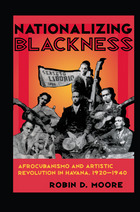
Nationalizing Blackness uses the music of the 1920s and 1930s to examine Cuban society as it begins to embrace Afrocuban culture. Moore examines the public debate over “degenerate Africanisms” associated with comparas or carnival bands; similar controversies associated with son music; the history of blackface theater shows; the rise of afrocubanismo in the context of anti-imperialist nationalism and revolution against Gerardo Machado; the history of cabaret rumba; an overview of poetry, painting, and music inspired by Afrocuban street culture; and reactions of the black Cuban middle classes to afrocubanismo. He has collected numerous illustrations of early twentieth-century performers in Havana, many included in this book.
Nationalizing Blackness represents one of the first politicized studies of twentieth-century culture in Cuba. It demonstrates how music can function as the center of racial and cultural conflict during the formation of a national identity.

In a moving blend of family history and cutting-edge scholarship, Tracey Owens Patton’s A Nation’s Undesirables synthesizes work in rhetorical postmemory studies, critical adoption studies, Afrofuturism, and more to tell the story of her mother and aunt, Lore and Lilli. Two of thousands of children born to white German women and Black American men after World War II, the twins moved to the United States at age seven, where their mother renounced her parental rights and put them into the adoption system. They did not see her again for fifty-two years.
Patton takes up the twins’ story and their reckoning with their mixed-race, Black German identity to disrupt standard narratives around World War II, Black experience in Germany, and race and adoption. Combining family interviews, historical artifacts, and autoethnographic reflection, Patton composes a new narrative of women and Black German children in the postwar era. In examining the systemic racism of Germany’s efforts to move children like Lore and Lilli out of the country—and the suppression of German women’s bodily autonomy—Patton amplifies the once unacknowledged identities of these Black German children to broaden our understanding of citizenship, racism, and sexism after World War II.

Michela Marcatelli unravels this inequality paradox through an ethnography of water in a rural region of the country. The Waterberg Plateau is a space where agriculture, conservation, and extraction coexist and intersect. Marcatelli examines the connections between neoliberalism, race, and the environment by showing that racialized property relations around water and land are still recognized and protected by the post-apartheid state to sustain green growth. She argues that the government depicts growth as the best, if not only, solution to inequality. While white landowners maintain access to water, however, black ex-farmworkers are dispossessed once again of this essential-to-life resource.
If the promise of growth serves to normalize inequality, the call to save nature has the effect of naturalizing it even further.
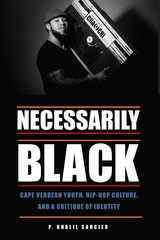
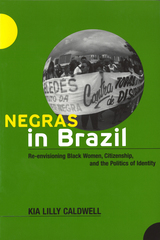
In Negras in Brazil, Kia Lilly Caldwell examines the life experiences of Afro-Brazilian women whose stories have until now been largely untold. This pathbreaking study analyzes the links between race and gender and broader processes of social, economic, and political exclusion. Drawing on ethnographic research with social movement organizations and thirty-five life history interviews, Caldwell explores the everyday struggles Afro-Brazilian women face in their efforts to achieve equal rights and full citizenship. She also shows how the black women's movement, which has emerged in recent decades, has sought to challenge racial and gender discrimination in Brazil. While proposing a broader view of citizenship that includes domains such as popular culture and the body, Negras in Brazil highlights the continuing relevance of identity politics for members of racially marginalized communities. Providing new insights into black women's social activism and a gendered perspective on Brazilian racial dynamics, this book will be of interest to students and scholars of Latin American Studies, African diaspora studies, women's studies, politics, and cultural anthropology.
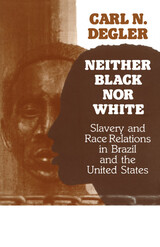
Carl Degler’s 1971 Pulitzer-Prize-winning study of comparative slavery in Brazil and the United States is reissued in the Wisconsin paperback edition, making it accessible for all students of American and Latin American history and sociology.
Until Degler’s groundbreaking work, scholars were puzzled by the differing courses of slavery and race relations in the two countries. Brazil never developed a system of rigid segregation, such as appeared in the United States, and blacks in Brazil were able to gain economically and retain far more of their African culture. Rejecting the theory of Giberto Freyre and Frank Tannenbaum—that Brazilian slavery was more humane—Degler instead points to a combination of demographic, economic, and cultural factors as the real reason for the differences.
“In the early 1970s when studies in social history were beginning to blossom on the North American scene, Carl Degler’s prize-winning contribution was a thoughtful provocative essay in comparative history. Its thoughtfulness has not diminished with the years. Indeed, it is as topical today as when it was first published. The Brazilian experience with rapid industrialization and its attempt to restore democratic government indicates that the issues which Degler treated in the early 1970s are more pertinent than ever today.”—Franklin W. Knight, Department of History, Johns Hopkins University.


Wilson models a practice of reading that honors the disruptive possibilities offered by an ever-present awareness of that which lies, irretrievable, beyond the horizon of vanishing itself. In doing so, he engages with historical accounts detailing maroon activities in early New Spain, contemporary coverage of the push to make legible Afro-Mexican identities, the electronic archives of the Obama presidency, and the work of Carlos de Sigüenza y Góngora, Octavio Paz, Ivan Van Sertima, Miguel Covarrubias, Steven Spielberg, and Colson Whitehead, among others.
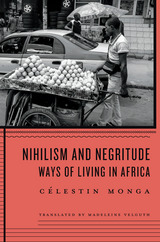
There are two common ways of writing about Africa, says Célestin Monga. One way blames Africa’s ills on the continent’s history of exploitation and oppression. The other way blames Africans themselves for failing to rise above poisonous national prejudices and resentments. But patronizing caricatures that reduce Africans to either victims or slackers do not get us very far in understanding the complexities and paradoxes of Africa today.
A searching, often searing, meditation on ways of living in modern Africa, Nihilism and Negritude dispels the stereotypes that cloud how outsiders view the continent—and how Africans sometimes view themselves. In the role of a traveler-philosopher, Monga seeks to register “the picturesque absurdity of daily life” in his native Cameroon and across the continent. Whether navigating the chaotic choreography of street traffic or discoursing on the philosophy of café menus, he illuminates the patterns of reasoning behind everyday behaviors and offers new interpretations of what some observers have misunderstood as Africans’ resigned acceptance of suffering and violence.
Monga does not wish to revive Negritude, the once-influential movement that sought to identify and celebrate allegedly unique African values. Rather, he seeks to show how daily life and thought—witnessed in dance and music, sensual pleasure and bodily experience, faith and mourning—reflect a form of nihilism developed to cope with chaos, poverty, and oppression. This is not the nihilism of despair, Monga insists, but the determination to find meaning and even joy in a life that would otherwise seem absurd.
READERS
Browse our collection.
PUBLISHERS
See BiblioVault's publisher services.
STUDENT SERVICES
Files for college accessibility offices.
UChicago Accessibility Resources
home | accessibility | search | about | contact us
BiblioVault ® 2001 - 2024
The University of Chicago Press









